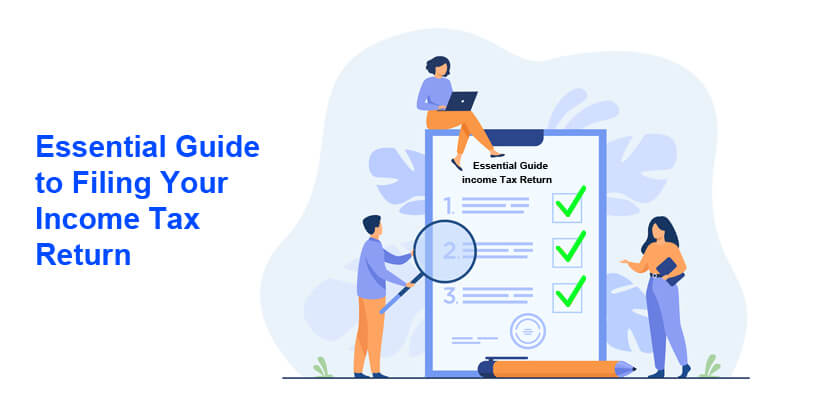
Please Wait transaction is in process, don't refresh page and do not press back button.
File your ITR Now and Claim Early Refund

Filing income tax returns is an annual ritual for every Indian taxpayer. Although this may seem like a complicated process, with the right guidance it becomes a manageable task. In this comprehensive guide, we'll explore everything you need to know about filing your income tax return, from gathering the necessary documents to optimizing deductions and credits and even navigating potential audits. Read some important guides for income tax return
Essential Documents for Tax Filing
Before diving into the tax filing process, make sure you have all the necessary documents available. This includes your Form 16 from employers, details of salary and tax deducted, along with Form 26AS, a summary of TDS and tax payments. Additionally, collect documents related to investments, assets and other income sources for accurate reporting.
Understanding Tax Structure and Filing Requirements
India's tax system runs on a progressive structure, with different tax rates for different income levels. It is important to know your tax slab and filing obligations based on income, age and residential status. Individuals crossing the taxable limit will have to file returns regardless of TDS deducted.
Optimization of Deductions and Exemptions
Taxpayers can avail various deductions and exemptions to reduce tax liabilities. From Section 80C investments to HRA and medical allowance, understanding and utilizing the available deductions can significantly reduce taxable income.
Navigating Investment Income Reporting
It is necessary to report income from investments such as interest, dividends and capital gains. Ensure accurate reporting of all investment-related income, including details of savings accounts, fixed deposits, mutual funds and stocks.
Self-Employed Individuals and Business Owners
Self-employed individuals and business owners should document income and expenses carefully. Use applicable forms to accurately report business income and deductions, ensuring compliance with tax regulations.
E-Filing: Convenience and Efficiency
E-filing has revolutionized tax filing by providing convenience and efficiency. Find authorized e-filing platforms for secure and fast return submission with digital signature and verification options.
Addressing mistakes and audits
Despite careful preparation, errors can occur on tax returns. In case of discrepancies, file amended returns immediately using the prescribed procedure. Prepare for potential audits by maintaining accurate records and responding promptly to IRS inquiries.
Understanding Tax-Saving Investments
Explore the various tax-saving investment options available to Indian taxpayers, such as Public Provident Fund (PPF), Equity Linked Savings Scheme (ELSS), National Pension System (NPS), and Sukanya Samriddhi Yojana ( SSY). , Discuss the benefits of these investments in reducing tax liability and achieving long-term financial goals.
Avoiding Common Pitfalls and Penalties
Highlight common mistakes to avoid while filing income tax returns, such as incorrect reporting of income, failure to disclose assets and liabilities and non-compliance with tax deadlines. Discuss the penalties and consequences of non-compliance, including interest charges, penalties and legal implications, and provide practical tips for error-free tax filing and ensuring compliance with tax laws.
Form List of Income Tax
There are seven types of forms. Here is a list of form types.
ITR-1 (SAHAJ) : Also known as SAHAJ, this form is for individuals who have income from salary, a house property, other sources and total income. Up to ₹50 lakh.
ITR-2 : This form is for individuals and Hindu undivided families (HUFs) who are not eligible to file ITR-1 and have income from salary, house property, capital gains and other sources.
ITR-3 : Applicable for individuals and HUFs having income from profits and gains of business or profession. It is also applicable for partners in a firm.
ITR-4 (Sugam) : Also known as Sugam, this form is for individuals, Hindu undivided families (HUF) and firms (other than LLP) whose income from business or profession is calculated under the presumptive taxation scheme.
ITR-5 : Applicable to firms, LLP (Limited Liability Partnership), Association of Persons (AOP), Body of Individuals (BOI), artificial juridical persons, co-operative societies and local authorities.
ITR-6 : This form is for companies other than companies claiming exemption under section 11 (Income from property held for charitable or religious purposes).
ITR-7 : Individuals including companies required to furnish return under section 139(4A) or section 139(4B) or section 139(4C) or section 139(4D) or section 139(4E) or section 139(4F) applicable for.
Latest Post
House Rent Allowance (HRA) Exemption in ITR Online
11-February-2025
Tractor Insurance: Why It’s Essential for Your Tractor?
17-January-2025
Bike Insurance: How to file two wheeler insurance claim
15-January-2025
Tags